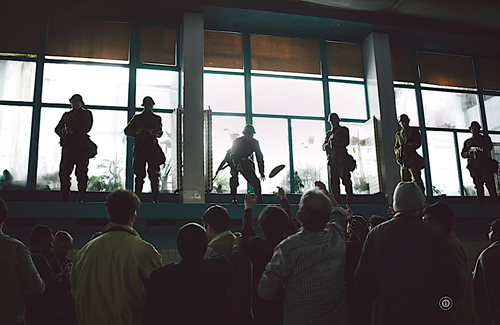
By Robert St. Martin
Westwood, California (The Hollywood Times) 05/07/2024
Libertate is a Kafkesque cinematic account by Tudor Giurgiu of one incident in the 1989 Romanian Revolution that took place in the city of Sibiu, where a veritable civil war broke out between the military and assorted branches of the police. Giurgiu captures the chaos of the fighting between the Securitate Romanian secret police and those who assumed to be unofficially under their direction with the civic breakdown in Sibiu. Libertate screened on Saturday night at the James Bridges Auditorium on the campus of UCLA to a large audience attending the annual SEEfest Film Festival. The screening was followed by an informative Q&A with director Tudor Giurgui.
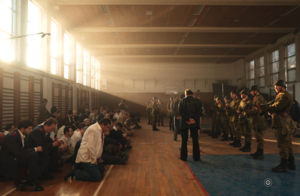
Libertate feels like two separate films. The first is an amazing feat of controlled confusion in which bullets are constantly firing all over the place, but it is impossible to tell from where or whom. The second, longer part is an agonizingly claustrophobic exercise in absurdity as various arrested police and others are labeled as “terrorists” and put into large indoor swimming pool without water as a holding tank. Arguably, both successfully transport viewers to a very particular place and time, under extraordinary circumstances, but the first is viscerally powerful, while the second is relentlessly uncomfortable.
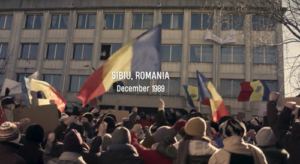
Of the images from the Romanian Revolution that occurred in the last few days of 1989, we tend to recall the photo of the dictator Ceausescu and his wife being shot by the army. We may also recall the simplified stories about how the 1989 Romanian Revolution all started in Timişoara, what happened in Bucharest and how the military sided with the people, against the police and the much-feared secret service, the Securitate, which remained faithful to the dictator until later on. However, we do not necessarily know about the events in, for instance, the Transylvanian town of Sibiu.
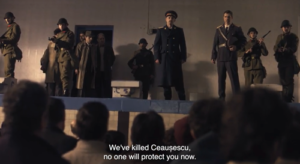
The opening info-card informs us that the regime of Nicolae Ceauşescu relied on pitting different groups, such as the army, police, secret service, and civilians, against one another so that it could have firmer control over each of them. But once the protests began, things escalated quickly, bringing the country to the brink of civil war. In Sibiu, the army interned policemen, suspected Securitate operatives and their contacts, as well as several civilians (some of them by mistake) in an empty swimming pool, where it kept them under guard until the captives were questioned, sentenced or released.
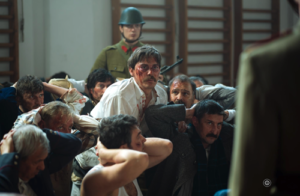
We observe the chaotic, civil war-like events from several perspectives of the people involved in different sides of the conflict. The (sort of) protagonist is police officer Viorel Stanese (Alex Calangiu) who decides to go to work on the fateful day when his police station is attacked by the angry mob, which soon enough get hold of weapons from the armory. Viorel and his colleagues then try to escape, but they are swiftly detained by the army and sent to the empty swimming pool.

Among the other points of view are those of opportunistic cab driver Leahu (Catalin Herlo), who may or may not be a secret-service informer, and Lieutenant Colonel Dragoman (Iulian Postelnicu), who, although initially on the right side of history, gets intoxicated by his newly acquired power over the life and death of people. Some other, shorter episodes include other individuals, some of them civilians who got arrested simply for being in the wrong place at the wrong time, while far-fetched theories about the terrorists poisoning water, digging tunnels, and preparing counter-revolutionary attacks on the army and the people do the rounds.

The approach that Giurgiu adopts is not dissimilar to the one he employed in his previous, fact-heavy political drama-thriller Why Me (2015), also based on true events, since the source materials of both films were obtained through extensive research into the two occurrences. However, things are less linear in Libertate, and Giurgiu and his co-screenwriter Cecilia Stefanescu focus on more than one individual and their stories.
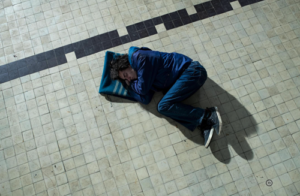
Tudor Giurgiu paints a realistic picture of the revolutionary chaos and turmoil, questions the established narratives and, most importantly, makes a thrilling film that grabs viewers’ attention, elicits an emotional response, and leaves a lasting impression.
Throughout it all, it is important to remember Ceausescu and his brutal “royal” family are the most to blame for all the chaos that erupted across Romania. He oppressed his country for years and then deliberately set the military against the police, hoping to exploit their in-fighting to escape his karma. Obviously, it didn’t work.
